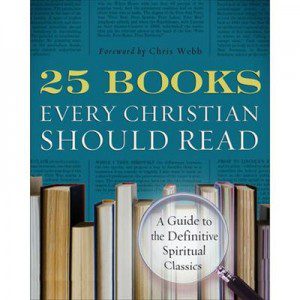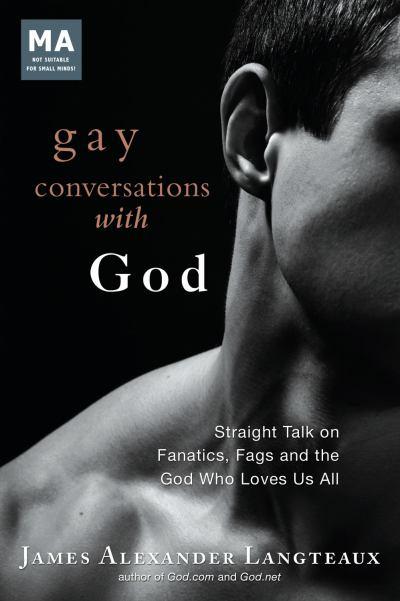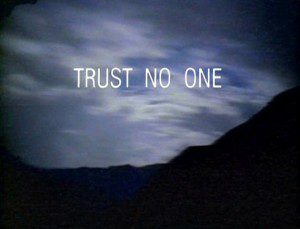Renovaré has a new book out that seems designed to start an argument. It’s called 25 Books Every Christian Should Read: A Guide to the Essential Spiritual Classics, and it’s just what it sounds like — an introduction to 25 classic works of Christian writing, with excerpts from each and short essays arguing for why these selections are worth reading.
 As with all such lists — think of those AFI lists, or those lists of “the best novels,” or NPR’s recent list of 100 science fiction books — part of the fun is the inevitable argument over which books should be included.
As with all such lists — think of those AFI lists, or those lists of “the best novels,” or NPR’s recent list of 100 science fiction books — part of the fun is the inevitable argument over which books should be included.
In this case, that argument ought to be a gentle one, seeing as these books are mostly classics of devotional literature whose most avid partisans ought to reflect the spirit of those books. One assumes that two friends with passionate opinions about, for example, the relative merits of The Practice of the Presence of God versus The Seven Storey Mountain would conduct their dispute in a manner that would make Brother Lawrence and Thomas Merton proud.
The Renovaré folks recognize this aspect of their project, and they see the fun in it, so they’ve structured their book to accommodate and encourage such discussion. Sprinkled throughout 25 Books are dozens of additional recommendations, including additional lists from a variety of interesting people — lists of their five favorites, or the six books they found most inspiring, or “Seven Books Those Idiots at Renovaré Unforgivably Failed to Include.” (No list is titled quite that explicitly, of course, but the editors are smart enough to realize that this is what many readers will inevitably be thinking.)
Patheos is also helping to continue that friendly argument with a book club forum on 25 Books.
The main list is a good one. I’ve read maybe half of these and am at least familiar with the rest, thanks in part to having been introduced to some of them years ago by a similar, earlier Renovaré publication called Devotional Classics. The excerpts, like the titles listed, are well-chosen, and the short essays make a good case for these entries.
The overall sense one gets from 25 Books is that of having an earnest, bookish friend enthusiastically pressing a stack of books into your lap and encouraging you to read them. Such enthusiasm — even from a stranger — is bound to nudge those titles higher in your mental queue of Books to Read Someday. But the weight we give such recommendations depends upon the friend making them. If it’s someone we trust and regard with affection, admiration and affinity, then the book may move to the top of the queue — even to the top of the nightstand.
So how much weight should we give to this stack of recommendations from Renovaré? That answer will depend, largely, on what one thinks of their list.
So let’s take a look at that list, and please let’s do have the friendly argument it’s bound to provoke.
Here is Renovaré’s list, followed by my suggested amendments, additions, etc.
- On the Incarnation, St. Athanasius
- Confessions, St. Augustine
- The Sayings of the Desert Fathers
- The Rule of St. Benedict, St. Benedict
- The Divine Comedy, Dante Alighieri
- The Cloud of Unknowing
- Revelations of Divine Love, Julian of Norwich
- The Imitation of Christ, Thomas a Kempis
- The Philokalia
- Institutes of the Christian Religion, John Calvin
- The Interior Castle, St. Teresa of Avila
- Dark Night of the Soul, St. John of the Cross
- Pensées, Blaise Pascal
- The Pilgrim’s Progress, John Bunyan
- The Practice of the Presence of God, Brother Lawrence
- A Serious Call to a Devout and Holy Life, William Law
- The Way of a Pilgrim
- The Brothers Karamazov, Fyodor Dostoevsky
- Orthodoxy, G.K. Chesterton
- The Poetry of Gerard Manley Hopkins
- The Cost of Discipleship, Dietrich Bonhoeffer
- A Testament of Devotion, Thomas R. Kelly
- The Seven Storey Mountain, Thomas Merton
- Mere Christianity, C.S. Lewis
- The Return of the Prodigal Son, Henri J.M. Nouwen
These are all worthy books and you won’t be wasting your time with any of them, but I’m not sure all of them belong in a short list of “essential spiritual classics.”
The Divine Comedy, for example, is one of the greatest human achievements in all of literature. You must read this before you die. Everyone should. But it’s not really a spiritual classic.
And if we’re only to have two poets in this list, must the other one be Hopkins? (My list of poets to include in this list would start with Emily Dickinson, Donne, Blake and Auden, and would probably go on for a bit longer before I got to Hopkins.) In general, I prefer poets to the sort of flat earnestness one encounters in a lot of the sort of writing that’s often regarded as “spiritual” or “devotional” — a category into which I’d lump several of the saintly works listed above, as well as some of the more recent entries there. “Till a’ the seas gang dry, my Dear, / And the rocks melt wi’ the sun!” strikes me as richer than “I really, really, really, really love you, very, very much” and that applies whether the object of love is human or divine.
Calvin’s Institutes is, again, a worthy and vastly influential book that every Christian ought to encounter and engage. It’s also a massive, sprawling book that I don’t think every Christian should or even could read in its entirety. Calvin wrote it in a great rush at a standing desk next to an open window in the winter so that he could work late into the night without falling asleep. I needed a similar arrangement to keep awake while reading it. I’m not saying Calvin doesn’t belong in a list like this one, just that the Institutes is not the best place to start. When you want to introduce readers to Joyce, you give them Dubliners or Portrait — you don’t hand them a copy of Finnegan’s Wake and say, “Good luck.”
If we’re going to include C.S. Lewis here, then let’s go with The Screwtape Letters, which is funnier, more insightful and a better crafted bit of writing than Mere Christianity (which is also a valuable book, but the reader can tell it began as a series of radio lectures that was later cobbled together).
The additional lists in 25 Books and an appendix on contemporary authors mention many of the writers or titles I would want to add to the list above: The Journal of John Woolman, Gustavo Gutiérrez’ A Theology of Liberation, Abraham Joshua Heschel’s The Prophets, John Howard Yoder’s The Politics of Jesus, A Good Man Is Hard to Find and the letters of Flannery O’Connor, and various works by N.T. Wright, Anne Lamott and Wendell Berry.
What else to add? The formidably clear-eyed Annie Dillard, for one — Pilgrim at Tinker Creek, Teaching a Stone to Talk, Holy the Firm (all three — they’re short). And some Graham Greene — The Power and the Glory or Monsignor Quixote. Charles Williams’ Descent into Hell, Charles Sheldon’s In His Steps, Frederick Buechner’s Alphabet of Grace, and some Kathleen Norris (take your pick) and some Reinhold Niebuhr (who doesn’t seem very “devotional,” unless you’re a sinner — no one writes more clearly about what that means).
And then two more that I think are the most glaring and egregious omissions: Life and Times of Frederick Douglass and Martin Luther King Jr.’s sermons and essays. This is a book published in America and primarily for American Christians, and no one should attempt to understand the current shape of American Christianity without confronting how it came to be shaped that way. At some point, that means encountering Frederick Douglass. And any conversation that includes the phrase “Every Christian Should Read” also needs, somewhere, to include the phrase “Letter from a Birmingham Jail.”
I’m sure I’m also forgetting many things that unquestionably belong in this list. And I’m sure someone will remind me of what those are in comments below. I hope so, anyway, because I can’t enjoy the fun of a friendly argument by myself.
Update: I like the approach Carl Gregg takes to 25 Books — working his way through the list and recommending alternates for each title. Let me follow his example by suggesting a substitute for Dietrich Bonhoeffer’s The Cost of Discipleship.
That’s a great book and Bonhoeffer was an exceptional, heroic saint. But that’s also the problem with our cult of esteem for Bonhoeffer. Instead of viewing him as exceptional, we pretend that his exceptional courage in the moral crucible of the Holocaust is how we would have behaved as well. We vicariously congratulate Christianity in general, and ourselves in particular, by imagining that his response was typical of how the church responded to the Holocaust. But his response was far from typical. We turn Bonhoeffer into something like the white protagonists of films like Mississippi Burning or Cry Freedom — it’s a way of reassuring ourselves or absolving ourselves without having to confront the reality of evil and our complicity in it.
As a reminder of that, and as an antidote to the self-congratulatory temptation of pretending we were all Bonhoeffer in a past life, let me recommend We Wish to Inform You That Tomorrow We Will Be Killed With Our Families: Stories from Rwanda, by Philip Gourevitch. Christian faith plays almost no role in the horrifying story Gourevitch recounts, although many of the figures involved were Christians. Christians were among the victims, among the rescuers, among the resistance, among the genocidaires, among the collaborators. And Christians were among the millions who stood by, frozen, and watched it all unfold without intervening.












